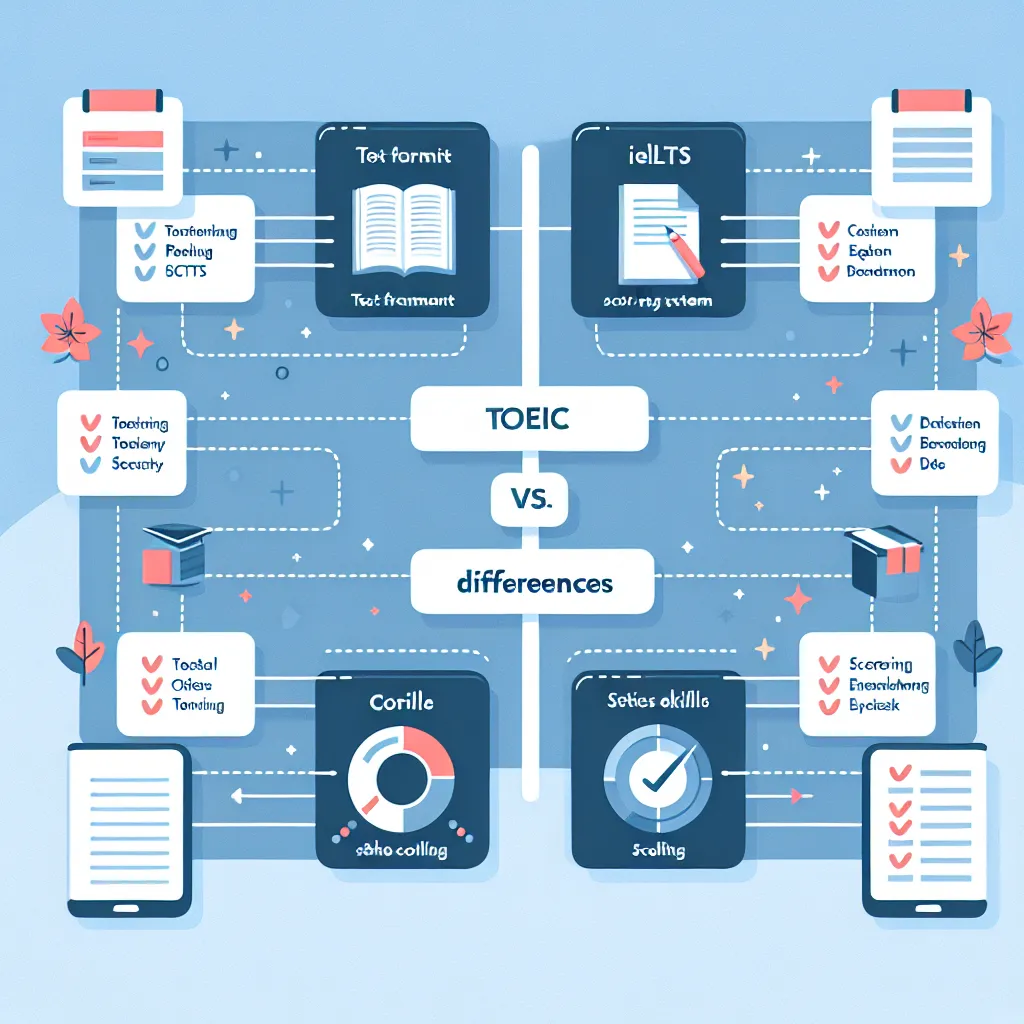Are you considering taking an English proficiency test but unsure whether to choose TOEIC or IELTS? This comprehensive guide will help you understand the differences between these two popular exams and determine if TOEIC can replace IELTS for your specific needs.
 TOEIC vs IELTS comparison chart
TOEIC vs IELTS comparison chart
Understanding TOEIC and IELTS
Before we dive into the comparison, let’s briefly introduce both exams:
TOEIC (Test of English for International Communication)
TOEIC is designed to measure the everyday English skills of people working in an international environment. It focuses primarily on business English and is widely recognized by corporations and organizations worldwide.
IELTS (International English Language Testing System)
IELTS is an English language proficiency test for non-native English speakers. It assesses all four language skills: listening, reading, writing, and speaking. IELTS is widely accepted for academic purposes, immigration, and professional registration.
Key Differences Between TOEIC and IELTS
To determine if TOEIC can replace IELTS, we need to examine the key differences between these exams:
-
Test Format:
- TOEIC: Primarily multiple-choice questions focusing on listening and reading skills.
- IELTS: Assesses all four language skills through various question types, including essay writing and a face-to-face speaking test.
-
Content Focus:
- TOEIC: Emphasizes business and workplace English.
- IELTS: Covers a broader range of topics, including academic and general English.
-
Scoring System:
- TOEIC: Scores range from 10 to 990.
- IELTS: Uses a band score system from 1 to 9.
-
Test Duration:
- TOEIC: Approximately 2 hours.
- IELTS: About 2 hours and 45 minutes.
-
Validity:
- TOEIC: No official expiration date, but some organizations may have their own policies.
- IELTS: Generally valid for 2 years.
Can TOEIC Replace IELTS?
The answer to this question depends on your specific needs and goals. Here are some scenarios where TOEIC might be suitable as an alternative to IELTS:
1. For Employment Purposes
If you’re seeking employment in an international business environment, TOEIC might be more appropriate. Many global companies recognize TOEIC scores as a measure of workplace English proficiency.
Example: Sarah, an IT professional, applied for a position at a multinational tech company. The company accepted her TOEIC score as proof of her English skills, as it closely aligned with the language used in their work environment.
2. For Certain University Programs
Some universities, particularly those offering business-related courses, may accept TOEIC scores. However, this is less common than IELTS acceptance.
Example: John applied to a Business Administration program in South Korea. The university accepted his TOEIC score, as they considered it relevant to the business-focused curriculum.
3. For Professional Development
If you’re looking to assess and improve your business English skills, TOEIC can be a valuable tool, even if it doesn’t directly replace IELTS.
Example: Maria, a marketing executive, took the TOEIC to benchmark her business English skills and identify areas for improvement in her professional communication.
When TOEIC Cannot Replace IELTS
There are several situations where TOEIC is not a suitable replacement for IELTS:
-
Academic Admissions: Most universities worldwide require IELTS for academic admissions, especially for English-speaking countries like the UK, Australia, and Canada.
-
Immigration Purposes: Many countries specifically require IELTS for visa applications and immigration processes.
-
Professional Registration: Certain professions, such as nursing or teaching in English-speaking countries, often require IELTS scores.
-
Comprehensive Language Assessment: If you need to demonstrate proficiency in all four language skills, especially writing and speaking, IELTS is more suitable.
Making the Right Choice
To decide whether TOEIC can replace IELTS for your needs, consider the following steps:
-
Determine Your Goal: Are you applying for a job, university admission, or immigration?
-
Research Requirements: Check with the specific organization or institution to see which test they accept.
-
Assess Your Skills: Consider which test format aligns better with your strengths and the skills you need to demonstrate.
-
Consider Test Availability: Look into the availability and frequency of both tests in your area.
-
Think Long-term: Consider which test will be more beneficial for your future goals.
Conclusion
While TOEIC can replace IELTS in certain scenarios, particularly in business-oriented contexts, it is not a universal substitute. IELTS remains the preferred choice for academic admissions, immigration, and comprehensive English proficiency assessment.
Ultimately, the choice between TOEIC and IELTS should be based on your specific goals, the requirements of your target institutions or employers, and your personal strengths in English language skills. Whichever test you choose, remember that both are valuable tools for assessing and improving your English proficiency.
[internal_links]
- Preparing for TOEIC: Essential Study Strategies
- IELTS vs TOEFL: Which Test Should You Take?
- Improving Your Business English for the TOEIC Exam
- Top IELTS Preparation Resources for Academic Success
[/internal_links]




